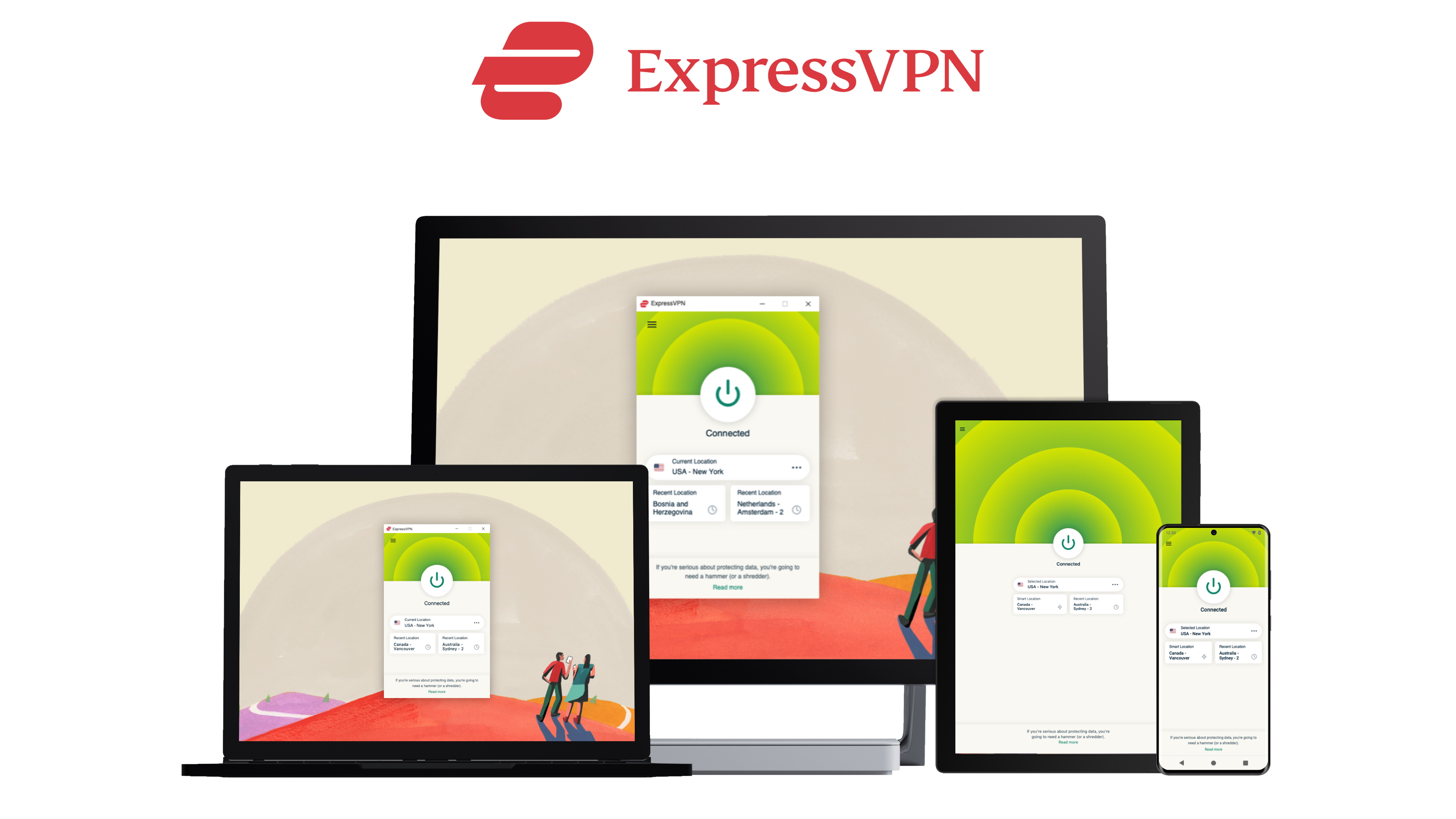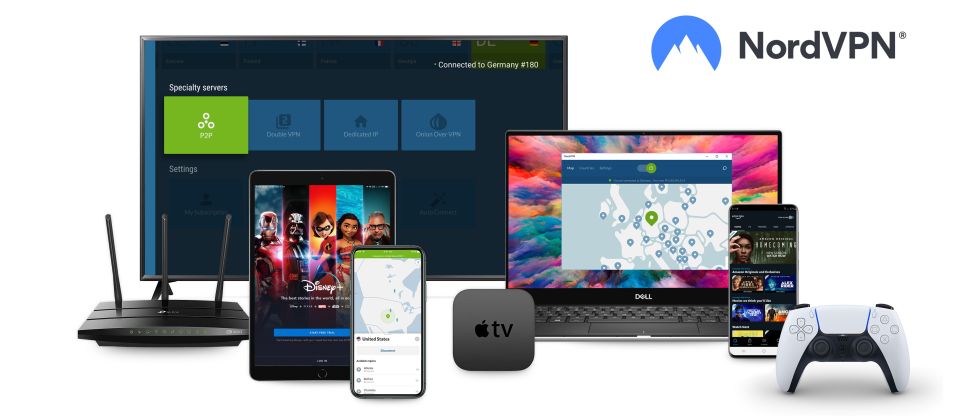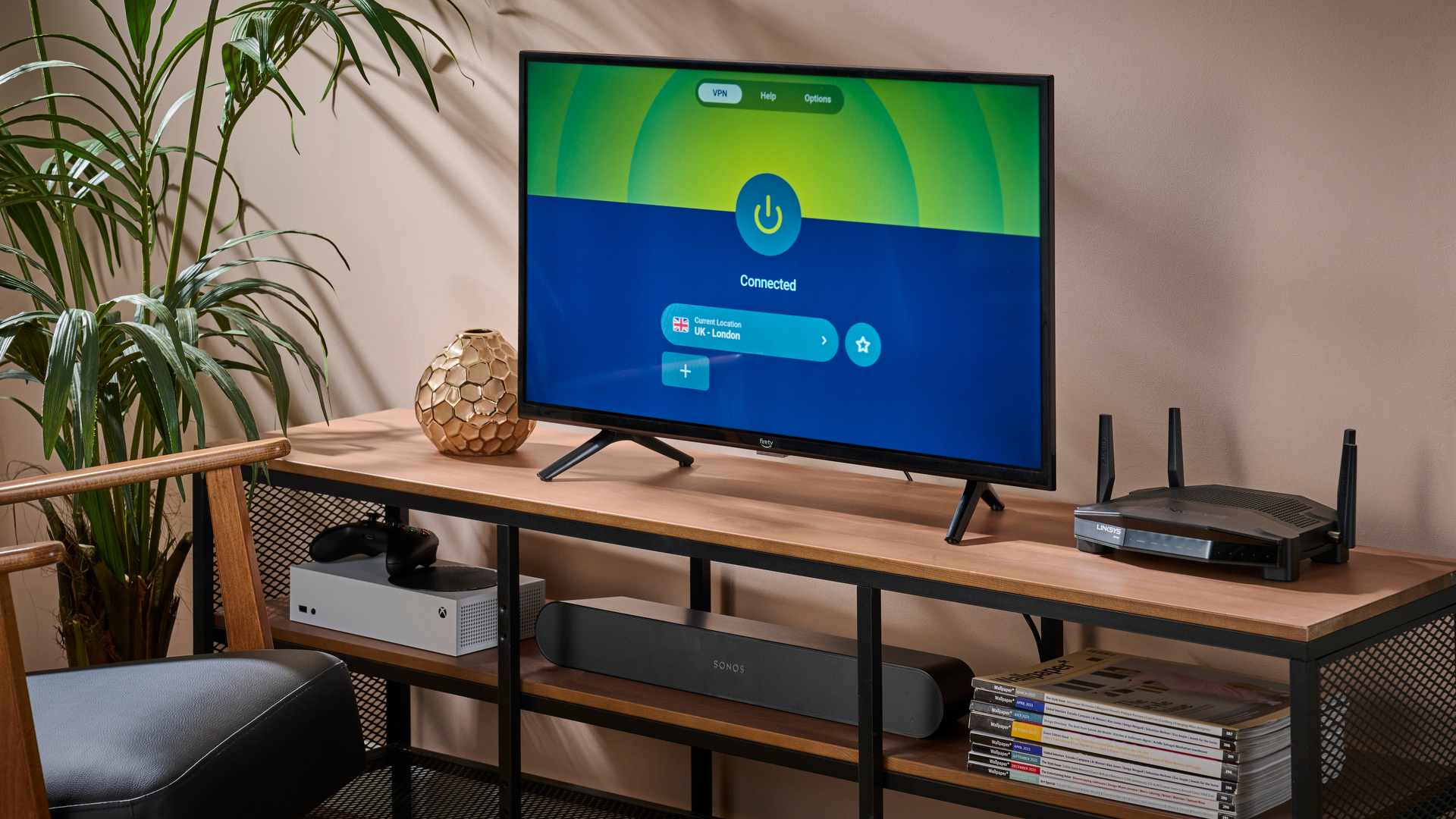ExpressVPN vs NordVPN: which VPN should you get?
Who wins between the planet's top two VPNs?


ExpressVPN is a luxe provider that doesn't take chances with your digital privacy. It's packed with tools, battle-tested encryption, and undergoes regular security audits. It's my #1 pick for beginners, too, thanks to its streamlined apps for all devices.
Pros
- Reliably unblocks streaming services
- Especially newbie-friendly
- Handles configuration for you
- Outstanding support
Cons
- Plans are expensive
- Not as fast as NordVPN

NordVPN sits at the top of our overall rankings because it is, quite frankly, the total package. It's quick, has all the tools you need to shore up your security, and its apps work like a charm on PCs, laptops, and mobiles. Plus, you'll have no trouble unblocking Netflix (and more).
Pros
- Wickedly fast
- Unblocks all streaming services
- Audited no-logs policy
- Servers everywhere
Cons
- UI tricky on smaller screens
- Data breach in 2018
Lowest monthly cost:
ExpressVPN: $6.67 (two years) | NordVPN: $3.39 (two years)
Number of servers:
ExpressVPN: 3,000+ | NordVPN: 6,000+
Server countries:
ExpressVPN: 106 | NordVPN: 111
Maximum simultaneous connections:
ExpressVPN: 8 | NordVPN: 10
Money back guarantee:
ExpressVPN: 30 days | NordVPN: 30 days
Both ExpressVPN and NordVPN offer easy-to-use apps that feel polished and responsive, and cater to both beginners who just want to get online and more experienced users looking to tailor their settings.
ExpressVPN's app takes a more minimalist approach to things – but the novelty of NordVPN's map layout can help new users to better visualize its server network. It also allows users to tap the country they'd like to connect to rather than scrolling through a lengthy server list.
Both VPNs have an impressive spread of servers around the globe. However, NordVPN has ExpressVPN beat here, with more than double the number of servers overall. More servers mean more choice, and can prevent issues with congestion that might otherwise slow your browsing and streaming to a crawl. If the server you've connected to feels sluggish – just pick a new one!
NordVPN has the advantage in terms of simultaneous connections, too. It currently offers 10 – which is on the more generous end of the spectrum. ExpressVPN's 8 isn't stingy by any means, but if you have a lot of gadgets in your house (or plan on sharing your subscription with friends and family), then NordVPN is the smarter pick.
ExpressVPN vs NordVPN: Pricing
Where NordVPN is the clear winner is in the subscription costs. ExpressVPN starts with a one-month plan that will cost you $12.95 per month. Opt for a 6 month subscription (paid in one lump sum) and the cost drops to $9.99 a month and if you’re willing to sign up for a one year subscription all at once, the cost drops all the way down to $6.67 a month, nearly half the cost of paying month-by-month.
NordVPN offers a monthly, 1-year and 2-year plans. For the monthly plan the cost ranges from $12.99 a month to $15.99 a month depending on the tier you pick. The real savings are to be found when you sign up for a longer-term subscription. For a 1-year plan, the costs run from $4.59 a month to $7.49 depending on tier, and for a 2-year plan it’s even cheaper, with the cheapest tier costing only $3.09 a month and the most expensive 2-year plan is still cheaper than ExpressVPN, clocking in at $5.99 a month.
Both ExpressVPN and NordVPN offer a 30-day money-back guarantee, allowing you to check out their service without worrying about being left out of pocket if you find they’re not right for you.
ExpressVPN vs NordVPN: Security
NordVPN and ExpressVPN are broadly similar when it comes to the security features they have in place to protect their users.
Both products use the strongest AES-256 encryption as well as Perfect Forward Secrecy (PFS). You can learn more about PFS by following the link, but in short it minimizes the risk posed to your personal data in case of any sort of breach by regularly changing the encryption keys. So even if your current session is compromised, your next will be protected as a new key will be used that the attacker doesn’t have access to.
Both NordVPN and ExpressVPN claim to block IP and DNS leaks (more on this in a little bit) and both of them sport their own encrypted DNS on all its servers.
NordVPN offers some excellent additional features like 1 TB of cloud storage, a data breach scanner, Onion over VPN for access to the Tor network, its double VPN system and even cyber insurance to protect against scams and fraud, showing it takes the security of its users very seriously.
ExpressVPN offers it own suite of features which, while not as extensive as NordVPN’s, includes an ad blocker and a password manager as well as its proprietary Lightway protocol to guarantee a fast connection, though it’s not as extensive an offering as NordVPN.
That all said, we can’t ignore the fact that everything hasn’t always been perfect. NordVPN suffered a data breach in 2018, but they bounced back strong from this setback, and even brought in bring in PricewaterhouseCoopers to verify its no-logging policy.
ExpressVPN isn’t without its issues as well, ones that we think are enough to dethrone it from our number one spot in our list of the best VPNs. One of our biggest concerns is that it’s now owned by Kape Technologies Plc (formerly known as Crossrider). Kape is a company with a somewhat checkered past involving ad-injectors and malware in web browsers, There’s also the fact that its CIO was implicated in a spying probe and, most concerningly of all, the recent discovery by CNET that ExpressVPN has been leaking DNS requests when users were connected through its split-tunneling feature.
While this issue was fixed quickly, the fact it went unnoticed for what could potentially have been years, coupled with Kape’s recent decision to lay-off around 200 staff, leaves us with concerns about the level of quality at the company
While ExpressVPN offers a solid core of features and a reliable VPN service, we feel that NordVPN is the better complete package.
ExpressVPN vs NordVPN: Privacy and logging
Whether or not a VPN logs data about its users is an important selling point for the privacy-conscious and we can confirm that both NordVPN and ExpressVPN’s privacy claims have been checked and verified by multiple independent audits.
NordVPN logs a minimal amount of data when you use its service. They log the date of connection and the choice of server. On its own, that information doesn’t put users at risk in any way. As no other data is stored there is no way of tracing anything back to a specific user.
ExpressVPN similarly offers a no-logs claim, and according to the privacy policy they log the day you’ve connected to one of their servers (not the time) and which server you’ve connected to. They also log which location you’ve connected to as well as from which country/ISP (but not the specific IP address)
In both cases, the logging policies are clear and easy to understand. It’s always a good sign when everything is laid out in a clear, easy-to-understand format.

ExpressVPN vs NordVPN: Performance
When connecting to servers around the world, both services did well, but NordVPN is just that bit more more reliable and very definitely the faster of the two. You can check out our full list of the fastest VPNS in our Fastest VPN List.
The performance of a VPN is crucial for day-to-day internet use. If using a VPN means your connection is reduced to a crawl then there’s there’s not much point in using it.
This isn’t something you need to worry about with either NordVPN or ExpressVPN. In part this is thanks to each using their own specific VPN protocols, whether it be Express's open-source Lightway and NordVPN's version of WireGuard called NordLynx.
In our most recent round of speed tests NordVPN has been the clear winner over ExpressVPN when using WireGuard (or Lightway/NordLynx), with our testing returning a download speed of over 950Mbps compared to Express's 410Mbps.
Even using the older OpenVPN protocol, the speeds were still more than enough for day-to-day use though here it was ExpressVPN that came out on top, averaging around 210 Mbps, while NordVPN peaked at a somewhat less impressive 110Mbps.
ExpressVPN vs NordVPN: Streaming
One of the biggest use-case for VPNs is to access geo-locked streaming services, and there’s a constant battle between streaming providers and VPNs when it comes to accessing content in other countries.
On its website ExpressVPN openly states which services it can unblock, which is something of a gutsy move as these services are constantly working to block VPN access. However, ExpressVPN walks the walk as well as talking the talk, our testing showing it can reliably unblock Disney+, YouTube and the BBC iPlayer.
NordVPN is no slouch in this department either, and even with companies like Netflix stepping up their efforts to lock out VPNs it was still able to reliably unblock the overseas catalogs of all the popular major streaming services as well as some more niche ones such as Australian services 9Now and 10 Play, which are only available down-under.
That makes this another category where the two are difficult to separate.
ExpressVPN vs NordVPN: Torrenting
If you torrent without using a VPN, you’re exposing your IP address to everyone you’re sharing files with and a VPN is an indispensable safety tool to keep you anonymous. We think both ExpressVPN and NordVPN offer excellent P2P functionality.
ExpressVPN is more open to torrenting than some other providers, with P2P supported on all of its servers. The company also states there are no bandwidth restrictions and no data cap. It's a refreshingly hassle-free experience.
NordVPN also supports P2P on all its servers, as well as offering servers specifically optimized for P2P. As with ExpressVPN there’s no restrictions or data cap and there’s a kill-switch to keep your traffic private in case of a loss of VPN connection.

ExpressVPN vs NordVPN: Mobile apps
Staying safe when you’re out and about and want to use a public Wi-Fi hotspot is a big concern, especially for those who like to work in cafes or use public transport frequently. This is why secure, reliable and easy to use mobile apps are an essential feature of any VPN.
Both ExpressVPN and NordVPN have two of the best best Android VPN apps around, and both are certified by the ioXt Alliance - a cybersecurity watchdog. Another sign that these two VPNs really take security seriously.
NordVPN’s mobile apps are powerful and easy to use, as you’d expect from such a full-featured VPN. It includes Threat Protection Lite, which is DNS blocking for ads, trackers, and malicious websites, but only when the VPN is connected. Protocol options on Android devices include NordVPN's speedy NordLynx, along with OpenVPN. iOS devices get slightly more options with the inclusion of IKEv2.
ExpressVPN’s apps are also full-featured, with a selection of protocols (including its own Lightway) available and a clean layout that beginners will find easy to get to grips with. It’s as eas
ExpressVPN vs NordVPN: Support
While we would certainly hope that you won’t have problems with your VPN, the inescapable fact of our modern world is that sometimes technology goes wrong! Having an easy-to-use support service can mean the difference between a quick fix and hours of frustration.
NordVPN sports a comprehensive support database that covers pretty much everything you might need to know about its products, from basic installation questions to getting started with streaming or troubleshooting connectivity issues. It also offers email and live chat options if you can’t find what you’re looking for in the support site. There’s no phone number, which is a bit of a shame, but we imagine these days most people will be happy with the options on offer.
ExpressVPN is much the same, with an in-depth support database supplemented by email and live chat if you find you can’t locate the specific issue you’re facing. Both services offer 24/7 live chat, so if you find yourself stuck you can reach out and talk to a real person.
Both support sites are laid out in much the same way, and both have plenty of useful information, though NordVPNs is a little more sleek and polished.
ExpressVPN vs NordVPN: Which is better?
Both NordVPN and ExpressVPN remain our top two picks and we think they’re both a great choice, but in our opinion NordVPN is the clear leader in 2024 and the best VPN around right now. Head over here to sign up and try it out for yourself.
NordVPN and ExpressVPN have been the industry leaders for years now, and their reputations are rightly deserved. ExpressVPN has been our top pick for a number of years here at Techradar but it’s difficult to ignore the gap between it and NordVPN in terms of price and included features, to say nothing of ExpressVPN’s new owner.
How we test VPNs
With there being so many VPNs to choose from, it’s important to know which ones are worth your time, which ones live up to the claims they make in their adverts, and which really should be avoided.
Here at Techradar we’ve been putting VPNs through their paces for years now, and in fact we conduct an in-depth analysis of the top 30 VPN services every 6 months to ensure they’re still providing the quality of service they claim.
We make sure it lives up to the marketing. Whether it’s a free VPN or a paid one, it must provide the service it advertises, otherwise you’re just wasting your money. With our top recommendations like ExpressVPN and NordVPN, we make sure customers are getting their money's worth. We test the claimed connection speeds and the ability to unlock streaming services around the world of every VPN we recommend by checking with multiple shows to see if the VPN can access and play them all or if it struggles with some of them.
We make sure that it’s something users will find easy to live with in the day-to-day. We look at points such as how easy it is to get the VPN app installed and set up, how much attention to detail has been paid in is in the design and whether a beginner will be able to get to grips with it or if it requires specialist knowledge that limits the appeal.
We also look at what security tools each provider offers. Does it include other features and functionality to keep its users safe? But more than that, we check to see if there’s any sneaky things hiding where the average user might not look. Does the privacy policy clearly state how your data will be handled?
Are there any sneaky little gotchas hiding buried deep in the Terms of Service? Is the pricing open and honest or does it use dark patterns or deceptive wording to trick you into paying more than you need to? The ultimate point of all our testing is not just to look at what a provider says it gives you, but what it really gives, and whether you can trust it with your data and your wallet.
We test and review VPN services in the context of legal recreational uses. For example:
1. Accessing a service from another country (subject to the terms and conditions of that service).
2. Protecting your online security and strengthening your online privacy when abroad.
We do not support or condone the illegal or malicious use of VPN services. Consuming pirated content that is paid-for is neither endorsed nor approved by Future Publishing.
Sign up for breaking news, reviews, opinion, top tech deals, and more.

After graduating from Stirling University with a qualification in Education, Shaun accidentally fell into the technology sector in the late 1990's and has stayed there ever since, working for companies such as PSINet, IBM and ProPrivacy in a variety of roles from Systems Administration to Technical Writer. Being around since the birth of the modern internet, he's seen the way that technology has expanded to become an integral part of everyday life, and how people's understanding and ability to retain any kind of privacy has lagged behind.
Shaun is a strong believer in the rights of the individual to have their personal data protected and their privacy respected – a belief made all the stronger in an age of surveillance from both governmental bodies and private companies all around the world.
He spends his spare time cooking, riding his motorbike and spending far too many hours in Star Trek Online hunting Klingons and Borg.
You must confirm your public display name before commenting
Please logout and then login again, you will then be prompted to enter your display name.